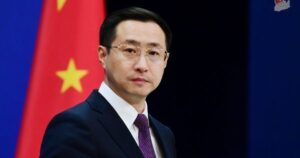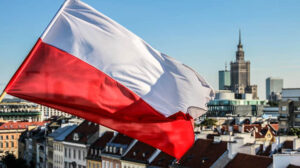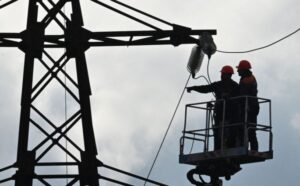
Beijing has never provided weapons to either side of the Ukrainian conflict and does not intend to tolerate G7 attempts to put the blame on China, Chinese Foreign Ministry spokesman Lin Jian said on Thursday.
“China has always been open and honest about the Ukrainian crisis, has not provided lethal weapons to either side of the conflict, strictly controls dual-use goods and will never accept the G7’s attempts to shift blame or label China,” the Global Times quoted a Foreign Ministry spokesman as saying.
Lin Jian commented on the statement of the G7 foreign ministers, in which the ministers condemned Beijing for allegedly transferring weapons and dual-use goods to Moscow.
The Foreign Ministry spokesman noted that the authors of the statement ignored the facts and deliberately vilified China, interfering in the internal affairs of the country. He emphasized that Beijing is extremely dissatisfied with such a position of the G7 and strongly opposes the statement.
In a joint statement issued on Thursday night, the G7 foreign ministers condemned countries they believe are supporting Russia in its war against Ukraine.
“We condemn the provision of military support to Russia by the DPRK and Iran, as well as the provision of arms and dual-use goods by China,” the statement said.
The ministers also expressed concern over the “military build-up by the Chinese army” and “unilateral attempts to change the status quo, in particular by force or coercion” in the East China Sea and South China Sea.

The Polish Ministry of Internal Affairs and Administration has submitted an application to the European Commission for complete exemption from the solidarity mechanism under the migration pact, the ministry’s press service reported on Wednesday.
“For months, we have been stating our disagreement with any resettlement mechanisms. Poland incurs enormous costs to protect the European Union’s borders, faces migration pressure from Belarus, and accepts military refugees from Ukraine. It is important to note that the decision to submit such an application means protection for many years, not just one. We announced this and kept our word,” commented Polish Interior Minister Marcin Kerwinski, quoted by the ministry’s press service.
Earlier, Polish Prime Minister Donald Tusk said that the country would definitively refuse to implement the EU migration pact. President Karol Nawrocki and Foreign Minister Marcin Kerwinski also announced their intention to oppose the implementation of the EU migration pact in Poland.
As reported, the Polish-Belarusian border has suspended the acceptance of applications from foreigners for international protection. The relevant resolution of the Polish government, valid for 60 days, came into force on March 27, 2025, and was subsequently extended by the Sejm.
Source: http://relocation.com.ua/poland-plans-to-withdraw-from-the-eu-migration-pact/

On Friday, November 14, in the southern part, in the Prykarpattia and most of the central regions at night and in the morning fog, Ukrhydrometcenter reports.
“November 14 in the southern part, in the Carpathian region and in most central regions at night and in the morning fog, visibility 200-500 m (I level of danger, yellow)”, – stated in the message of forecasters on Thursday.
It is noted that weather conditions may lead to complications in traffic.

A diamond brooch, believed to have belonged to Napoleon Bonaparte, was purchased by a private collector for $4.4 million at a Sotheby’s auction in Geneva.
This significantly exceeded the estimated value of $150-250 thousand.
According to the lot description, this brooch can be clearly identified as a hat decoration left by Napoleon in his carriage during his retreat from the battlefield at Waterloo in 1815. The Prussian army then captured and confiscated at least two carriages carrying the emperor’s personal belongings, including his medals, weapons, silverware, hat, and jewelry box.
Field Marshal Gebhard Leberecht von Blücher made a note that he had sent Napoleon’s captured hat and sword to the Prussian King Frederick William III because they had symbolic value. The brooch remained in the possession of the royal house of Hohenzollern for about two centuries, and in recent years has been in a private collection.
The jewelry is round in shape. In its center is an oval diamond weighing 13.04 carats. The main stone is surrounded by nearly a hundred smaller diamonds of various shapes and sizes.
Another lot related to Napoleon was presented at the Royal & Noble Jewels auction – a green beryl weighing almost 133 carats. The first written mention of this stone appears in the will of Elizabeth Ludovika of Bavaria, Queen of Prussia. It is described as “an aquamarine in a diamond setting worn by Napoleon during his coronation.”
The green beryl was sold for $32,000, with an estimate of $40,000-60,000.

In January-October 2025, Ukraine increased imports of copper and copper products by 27.4% compared to the same period last year, to $148.05 million.
Copper exports during this period increased by 15.1%, reaching $84.02 million, according to the State Customs Service.
In October, imports amounted to $14.46 million, while exports amounted to $12.91 million.
For comparison: in 2024, copper imports remained almost unchanged at $140.8 million, while exports increased by 22.4% to $88.24 million.
Copper is widely used in electrical engineering, in the production of pipes, in the creation of alloys, in medicine, and in other industries.

The European Bank for Reconstruction and Development (EBRD) plans to provide NEC Ukrenergo with a state-guaranteed loan of up to EUR90 million for the reconstruction of selected substations in the country.
“It is expected that the loan, if possible, will be co-financed by investment grants from international donors totaling up to EUR60 million for the purchase of reserve stocks of electrical equipment and equipment for inter-system connections,” the bank said in a statement on its website.
The project is currently awaiting approval by the bank’s board.
As explained by the EBRD, the goal of the project, with a total cost of EUR 150 million (EUR 90 million + EUR 60 million), is to increase the resilience of the power transmission system in the face of constant attacks to ensure uninterrupted power supply to the population and businesses throughout the country.
In particular, the current loan will be used to reconstruct three existing substations and complete the construction of one new substation in Ukraine, which was started as part of a project financed by the bank in 2014.
The reconstruction of the three existing substations and the completion of the new substation will be carried out in accordance with international best practice, using equipment that meets EU requirements. Some of the damaged or destroyed equipment will be replaced.
Currently, the new substation with 330 kV overhead power lines is being built at the stage of already laid foundations using EBRD loan funds saved as part of the project to build the 750 kV Zaporizhzhya NPP – Kakhovka power line.
As the EBRD recalled, since February 2022, the bank has provided Ukrenergo with three loans as part of its ongoing support, including emergency capital support and emergency investments aimed at restoring the power transmission network after serious damage caused by the Russian military invasion of Ukraine.
According to the EBRD, Ukrenergo has provided the bank with satisfactory reporting on these loans, as well as generally satisfactory reporting in the past. It has the national capacity to implement the bank’s environmental and social requirements (ESR), as well as national and European legislation. The company is strengthening its ESG management system, including inclusive measures, to help it report on sustainability issues in the future in accordance with the EU Corporate Sustainability Reporting Directive (CSRD).
As reported with reference to Maxim Khlapuk, a member of the Verkhovna Rada’s energy committee, as of June 2025, the total amount of credit funds under agreements between Ukrenergo and the EBRD, as well as the European Investment Bank (EIB), amounted to EUR1.22 billion, of which EUR 215.5 million remained unutilized, and with the International Bank for Reconstruction and Development (IBRD) – $509.74 million, of which $54.87 million remained unutilized.
In addition, under two grant agreements between Ukraine and the IBRD for EUR 37.7 million and $200 million, EUR 18.9 million and $134.5 million remained unutilized, respectively.
EBRD, LOAN, POWER GRID, RECONSTRUCTION, SUBSTATION, UKRENERGO